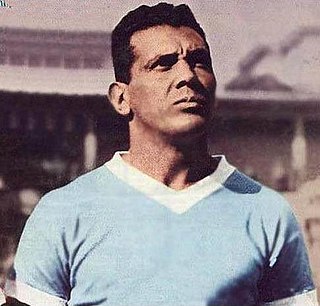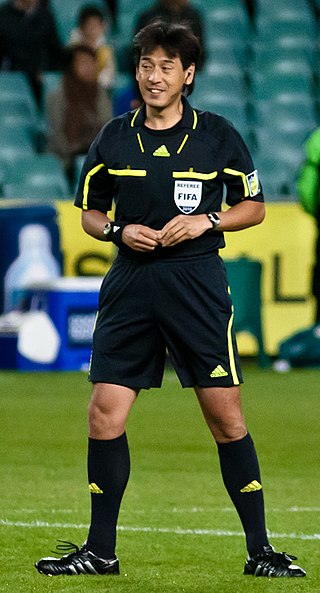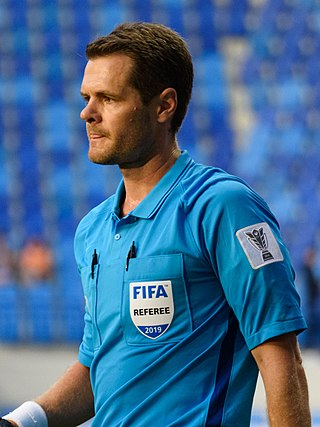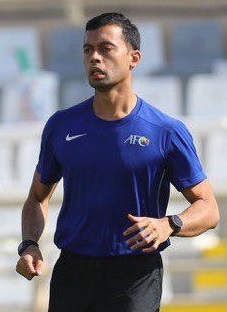
The 1950 FIFA World Cup was the 4th edition of the FIFA World Cup, the quadrennial international football championship for senior men's national teams. it was held in Brazil from 24 June to 16 July 1950. It was the first World Cup tournament in over twelve years, as the 1942 and 1946 World Cups were cancelled due to World War II. Italy, the two-time defending champions, were eliminated in the first round for the first time in history. Uruguay, who had won the inaugural competition in 1930, defeated the host nation, Brazil, in the deciding match of the four-team group of the final round. This was the only tournament not decided by a one-match final. It was also the inaugural tournament where the trophy was referred to as the Jules Rimet Cup, to mark the 25th anniversary of Jules Rimet's presidency of FIFA.

Obdulio Jacinto Muiños Varela was a Uruguayan football player. He was the captain of the Uruguay national team that won the 1950 World Cup after beating Brazil in the decisive final round match popularly known as the Maracanazo. He was nicknamed "El Negro Jefe" because of his dark skin and the influence he had on the pitch, especially during the unlikely victory over Brazil. He was of African, Spanish and Greek ancestry. Commonly regarded as one of the greatest classic holding midfielders, Varela was adept in defence and was renowned for his tenacity and leadership. He is regarded as one of the greatest captains in football history, and "he remains one of the biggest sporting heroes in Uruguay".

The match between Uruguay and Brazil was the decisive match of the final stage at the 1950 FIFA World Cup. It was played at the Maracanã Stadium in the then-capital of Brazil, Rio de Janeiro, on 16 July 1950.

Howard Melton Webb MBE is an English former professional football referee who officiated primarily in the Premier League from 2003 to 2014, as well as for FIFA as a FIFA international referee from 2005 to 2014.
George Mitchell was the first Scotsman to participate in a FIFA World Cup final match when he ran the line to George Reader in the 1950 final group match between Brazil and Uruguay.

Claus Bo Larsen is a former Danish football referee who officiates in the Danish Superliga and was FIFA-listed from 1996 to 2010. He has officiated numerous matches in the UEFA Europa League and Champions League. Larsen is classified as a FIFA Top Class Referee, which is the highest level of referees. He is well known for his down-to-earth appearance on the field, preferring to control the game with a good personality rather than cautioning the players.

Paul Taylor is a former English football referee, who also took charge of Premier League matches in 2000-2001 before reverting to the Football League. He also officiated in UEFA and FIFA competitions. He subsequently re-located to Hertfordshire.
Peter O'Leary is a New Zealand former Association football referee, previously of Wellington but now is residing in Hamilton. He operated in the Australian A-League and the New Zealand Football Championship, and his other occupation is as a teacher and deputy principal at Te Aroha College.

Ravshan Sayfiddin oʻgʻli Irmatov is an Uzbek professional football referee. He officiated in the Uzbek League from 2000-2019 and internationally from 2003-2019. Irmatov holds the record for officiating the most FIFA World Cup matches with 11.

Yuichi Nishimura is a Japanese football referee. He has refereed in the Japanese J. League Division 1 since 1999 and has been a full international referee for FIFA since 2004.
Mauricio Navarro is a Canadian soccer referee. Navarro was born in Chile but later moved to Vancouver, British Columbia, Canada and became a Canadian citizen. He attained his FIFA badge in 2000 and went on to become one of Canada's most successful referees before retiring and the end of 2011, having reached the mandatory retirement age.

Chris James Beath is an Australian former football referee in the A-League.

Sian Louise Massey-Ellis is an English football match official who officiates generally in the role of assistant referee in the Premier League and the Football League. She has also been appointed to matches in the Football League Trophy, UEFA Women's Champions League, FIFA Women's World Cup qualification rounds, the FIFA Women's World Cup and the UEFA Europa League. Massey-Ellis was appointed to the FIFA list of women assistant referees in 2009 and turned professional in 2010.

Björn Kuipers is a former Dutch football referee. He has been a FIFA listed referee from 2006 to 2021 and an UEFA Elite group referee from 2009 to 2021. He was assisted during international matches by Sander van Roekel and Erwin Zeinstra. A supermarket owner by occupation, Kuipers has officiated at two World Cups and three European Championship tournaments. It was announced on 29 July 2021 that Kuipers would be retiring from refereeing, officiating his final match between Ajax and PSV on 7 August in the 2021 Johan Cruyff Shield.

Mark William Geiger is an American sports administrator and former soccer referee. He is the senior director of match officials at the Professional Referee Organization (PRO), which oversees domestic referees in Major League Soccer (MLS). Geiger previously officiated in MLS and was on the FIFA International Referees List from 2008 to 2019. At the international level, Geiger refereed the 2012 Olympics, the 2013, 2015, and 2017 CONCACAF Gold Cups, and the 2014 and 2018 FIFA World Cups. At the 2014 World Cup, he became the first referee from the United States to officiate a knockout match at a World Cup tournament. Before becoming a full-time referee, Geiger was a high school mathematics teacher.

The 2013 FIFA Confederations Cup final was a football match to determine the winners of the 2013 FIFA Confederations Cup. The match was held at the Estádio do Maracanã, Rio de Janeiro, Brazil, on 30 June 2013 and was contested by the winners of the semi-finals, Brazil and Spain. Brazil defeated Spain 3–0 with goals from Fred and Neymar, thus breaking Spain's record of 29 competitive games without a defeat.

Robert Madley is an English professional football referee who was on the list of Select Group Referees who officiate primarily in the Premier League between 2013 and 2018. He officiated in the Football League as a referee from 2010 and was one of the youngest officials to progress to the top-flight of English football.

Muhammad Taqi Al-Jaafari bin Jahari is a Singaporean international football referee. He has been a FIFA listed referee since 2012, and has also refereed a number of AFC Champions League matches. He has also won the 2014 S.League Referee of the Year and the AFF Referee of the Year in 2017.
The final round of the 1950 FIFA World Cup took place from 9 to 16 July 1950. The final round consisted of Brazil, Spain, Sweden, and Uruguay. The winner of the final round was declared champions of the World Cup.
Esteban Daniel Ostojich Vega is a Uruguayan football referee. He has been a FIFA international referee since 2016.















